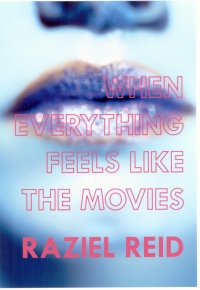| ________________
CM . . .
. Volume XXI Number 1. . . .September 5, 2014 
 |
When Everything Feels Like the Movies.
Raziel Reid.
Vancouver, BC: Arsenal Pulp Press, 2014.
171 pp., trade pbk. & EPUB, $15.95 (pbk.).
ISBN 978-1-55152-574-7 (pbk.), ISBN 978-1-55152-575-4 (EPUB).
Grades 10-12 / Ages 15-17.
Review by Rob Bittner.
**˝ /4
Reviewed from Advance Reading Copy.
|
| |
|

excerpt:
My mother’s closet was basically a sex shop. It was full of costumes and shoes, which she wore to work. That’s “work” in the original sense, although she werked for a living.
I’d take a pair of her shoes, and wear them down in the basement, pretending the cement floor was covered with a red carpet and the washer and dryer were paparazzi. I hoped the conspiracy theory that the iPhone camera lens is the all-seeing eye was true. Big Brother is watching you. Perfect! I love an audience.
When Everything Feels Like the Movies is a wildly campy interpretation of growing up and trying to break free from the constraints of a society that’s just too rigid for an up-and-coming glitterati. Jude (Judy) Rothesay, high school student, self-professed flamer, and aspiring paparazzi target, lives for fame and fashion, and everything around him feels like the movies. There are the Extras who fill the empty desks at school, the Crew who make everything happen, and the Stars, and Jude, who just doesn’t seem to fit into any category. Throughout the novel, Jude’s yellow brick road leads him in one inevitable direction, to the moment when maybe—just maybe—he can get gorgeous Luke Morris to be his Valentine’s Day date. But the yellow brick road, as we all know, leads through some pretty terrifying places.
Jude’s narrative is filled with exaggeration and merciless, often brutal, observations of those around him, including his friend Angela. His views on life are questionable at best, often sacrificing reason and sanity for glitz and glamour: “Fashion before comfort; you can be warm in hell.” There is so much melodrama in his story that readers are given little choice but to assume that Jude is living in a partially fabricated fantasy. His unreliability as a narrator leads to a layered and complex plot that will make readers second guess everything. And if one looks hard enough, it’s possible to see all the pain and desire lurking beneath the surface of his glittery exterior.
Secondary characters are far from desirable (with the exception of Jude’s brother, Keef, who is a sweetheart). Jude’s mother is an exotic dancer who seems to have very little desire to be a mom in any traditional sense, and Ray, her boyfriend, is a total jerk. The usual homophobes hang around Jude at school and show up at the most inconvenient times. Angela, Jude’s best friend, is more focused on having sex with the whole football team than being a real friend. And to make it worse, her desire to be bohemian often leads her to have unprotected sex and use abortion like a form of birth control (a disturbing mindset, to say the least, and one which will be sure to raise more than a few eyebrows.) Jude isn’t always a fan.
While I do feel that Reid’s novel will appeal to those with a flair for the dramatic, I do wonder about the intended audience. When Everything Feels Like the Movies is being marketed as a young adult novel—and I am trying to review it as such—but I am curious about how many of the numerous cultural references would be accessible to a contemporary teen audience, save for those few who are well-versed in the world of old Hollywood movie stars and queer subculture. While not detrimental to the novel’s success, I do believe these many references will lead to a smaller, niche audience, which should be taken into account for librarians and educators who come across the text.
Reid’s novel is truly a no holds barred examination of a young man attempting to explode into adulthood, with all the raw sexuality and gritty realism that such a journey entails. Though ultimately tragic the journey is really what is important here. Part Freak Show—a delightful novel by James St. James—and part Sunset Boulevard, flamboyant and gender-bending young people with a flair for the dramatic (and a strong stomach at times) will find much to grasp onto in When Everything Feels Like the Movies.
An intriguing and daring debut novel, indeed.
Recommended.
Rob Bittner is a graduate of the MA in Children’s Literature program at the University of British Columbia in Vancouver, BC. He is currently a doctoral candidate in Gender, Sexuality, and Women’s Studies at Simon Fraser University.

To comment
on this title or this review, send mail to cm@umanitoba.ca.
Copyright © the Manitoba Library Association. Reproduction for personal
use is permitted only if this copyright notice is maintained. Any
other reproduction is prohibited without permission.
Next Review |
Table of Contents for This Issue
- September 5, 2014.
CM Home | Back Issues
| Search
| CM Archive
| Profiles Archive
|
